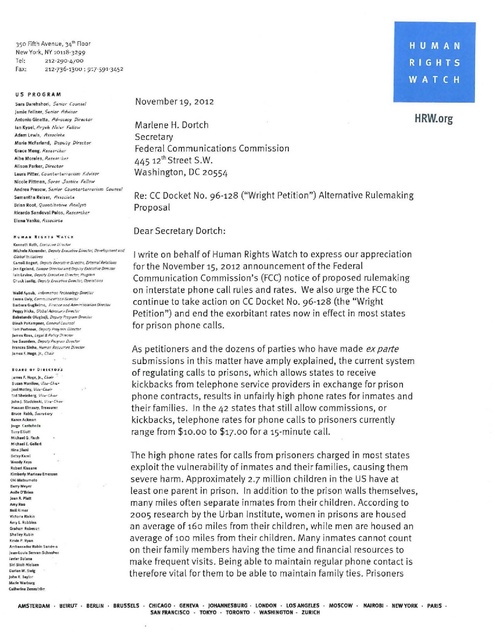Hrw Letter to Fcc Re Wright Petition 11-19-12
Download original document:

Document text

Document text
This text is machine-read, and may contain errors. Check the original document to verify accuracy.
350 Fifth Avenue, 34 11: Floor
New York, NY 10118-3299
Tel:
212-290-4700
Fax:
212-736-13°0; 917-591 -3452
us
PROGRAM
Sanll Darehshorl,
5eni~r
Counsd
November 19,2012
Ill mle Feitner, S.nior Ildvisor
Antonio Gin.ttll, IIdvoC<UlI Dire,tor
Ian Ky,e l, Ifry~h Ne ier Fel/?w
Marla Mcfarland ,
D~pu~!I
Dire,tor
GracI! Meng, R.c1ec",hcr
Alba Morales, Ru.,af";'U
Alison Parlier, Dir."tar
LaUnil Pine r, Count.,rterrorism F.dviJor
HRW.org
Marlene H. Dortch
Secretary
Federal Communications Commission
445 12th Street S.w.
Washington, DC 20554
Nicole PiHman, 50'-os Justice F.,lIoW'
Andrea PnilSOW, Seni",,. Counterl;"r,.orism Counscl
Silmantha Reiser, IfHo.: iate
Brian Root, Quant itatIVe Ilnalyst
Ricardo Sand oval Palos, Ruearcher
Re: CC Docket No. 96-128 ("Wright Petition") Alternative Rulemaking
Proposal
Elena Yanko, fiSJocit'te
Dear Secretary Dortch :
C."oll BOil", fMpulY b~utl ~ A /Krf'l, &1=,/ flt'I'/IOM
, ... Esoland, [u/'Op~ Dll'Kr,)f.~<tfMpuw bKur~Dr",:m
la in hvlne, Ihpury E;xKU':~ !JrI'Klaf, P",gqITJ
Chuck LUI''', ~p~ry Ex...-~I'~ 0.=(0". Op~f,/:cnl
W.lid A~oub, 1.. lofm",o~ rcd,nolofIY DirKlor
Em",. Dlly. (o,,"m lJl7k./ions DI..~lor
&.rb • •• GUlllol",o, F."n.ne. 'ndAdml ~islf"'on 0/,",101
Pon.,. HI,ks , Glob.IAd .... ,..-""OIr'!C/cl
B.b.,,,,,d, Olu,I>oII, fHp"~Pro~t;Jm Or/KIDr
Dlna~ PoKompnt', Gen~~"cllj,lt'i
T"", PQflOOUl, DcputyProrf"M (}irK/cr
j_muROIa,
I write on behalf of Human Rights Watch to express our appreciation
for the November 15, 2012 announcement of the Federal
Communication Commission's (FCC) notice of proposed rulemaking
on interstate phone call rules and rates. We al so urge the FCC to
continue to take action on CC Docket No. 96-128 (the "Wright
Petition") and end the exorbitan t rates now in effect in most states
for prison phone calls.
It'g.I &PoI~r :J!:w:Io'
Joe SI"nclcfS, DcputyPro;smr> Ot~lcl
frll ncu Sinh, Hum.n lIe.oJlJf';n DlrK/c'
j.mes f , HOlt, jr., C,~'1f
11m .. f . HOllO" •.,
,,,,,,'c
S',"n Mlnllow, Vi,~-'''''
jocl Malley. Vi.. -CJ,.ir
S,d Sh.inbe,1. Vil o-o, .. c
fohn j. Stlldd"" tl, V«.-C.~9<C
Hau." Elmury, "015"""
S."ce hbb, S. u oc .1"jI
h,onAc kml"
jOlIe CUllftedl
Tony (1110"
Michael G. Filch
As petitioners and the dozen s of parties who have made ex parte
submissions in this matter have amply explained, the current system
of regulating call s to prisons, which allows states to receive
kickbacks from telephone service providers in exchange for prison
phone contracts, results in unfairly high phone rates for inmates and
their famil ies. In the 42 states that still allow commissions, or
kickbacks, telephone rate s for phone calls to prisoners currently
range from $10.00 to $17.00 for a 15-minute call.
Michael E, GcUofl
Hln . jillnl
B~I.y
Konll
Wo ndy Key,
Robort Kln.1It::
OklMllsumolo
B.ny-M.,..,
....,If. D'Britn
jun R."",n
Am.,. RIo
H.IIRlm ••
Vlclo.l. RI' kln
Amy L. Robbin'
Gilham Robnon
ShUey Rubin
Kevin P. Ryl n
Amb ....dorRcbln S'nd~'a
Jun·lo,,1s s. ....." · Sch""Ioc'
lov!e, Sol....
S;,1 Stoll ,Nlelsen
Oari.nW,Swla:
John R. T• .,.lo.
The high phone rates for calls from prisoners charged in most states
exploit the vulnerability of inmates and their families, causing them
severe harm . Approximately 2.7 million children in th e US have at
least one pa re nt in prison. In addition to the pris on walls themselves ,
many mile s often separate inmates from their children. According to
2005 research by the Urban Institute, women in prisons are housed
an average of 160 miles from their children, while men are housed an
average of 100 miles from their children. Many inmates cannot count
on their family members having the time and financial resources to
make frequent visits. Being able to maintain regular phone contact is
therefore vital for them to be able to maintain family ties. Prisoners
MI'"
W.,burs
C.lho,lnelc" n,t,l)m
AMSTERDAM . BEIRUT ' BERLIN ' BRUSSElS ' CHICAGO , GENEVA ' JOHANNESBURG, LONDON ' LOS ANGELES . MOSCOW SAN fRANCISCO - TOKYO . TORONTO . WASHINGTON · ZURICH
NAIROBI· NEW YORK ' PARIS '
who, if able to obtain a paying job while incarcerated, make as little as $.03 an hour
simply cannot afford to help their families pay for expensive phone calls. As the New
York Times pointed out in a September 23,2012 editorial, inmates' families must
often choose between communicating with their loved ones and "putting food on the
table."
The main justification state officials cite for high phone rates is that providing phone
service to inmates entails increased security costs. Yet 11 states that have banned or
reduced kickbacks have seen their prison phone rates plummet and have reported
no increased security breaches since doing so.
The result of the current exploitative phone system is to effectively cut families off
from one another, undermining prisoners' and their relatives' human right to family
unity. Inmates and their families pay in the emotional anguish resulting from being
cut off from their support systems. Society at large also may pay in the higher rates
of recidivism that result from the social isolation of inmates, as prisoners who lack
community ties are more likely to reoffend when released from custody.
The Wright Petition has been pending since 2003. It is past time for the FCC to act on
the Wright Petition and put an end to the unconscionable prison phone system
currently in place.
Thank you for your consideration,
----
~
Maria McFarland
Acting Director, US Program
Human Rights Watch

